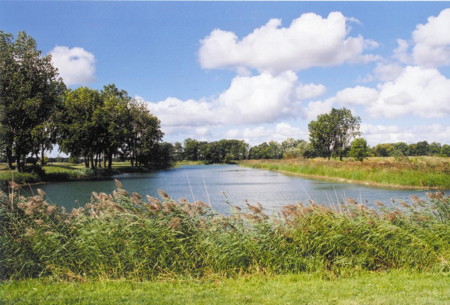Ethnographic site
| For the past ten years, I have engaged in collaborative research in a First Nations community located in Southwestern Ontario, Canada. Situated at the mouth of the St. Clair River, Walpole Island First Nation (WIFN) holds stewardship over a rich mosaic of natural areas that include world-renowned wetlands and some of North America’s most biologically diverse ecosystems. Despite being Canada’s southernmost reserve and in close proximity to densely populated urban centers, WIFN residents continue to |
 |
live off the land, relying on fishing and hunting for their subsistence and livelihood. Decades of accidental chemical spills and legal discharges from industries on both sides of the Canada-US border have impaired water quality in the region, threatening the integrity and survival of Walpole Island’s natural resources, traditional economies and cultural practices. Suspicion over the safety of the local drinking water and food sources has contributed to high levels of community stress and concerns over ecosystem health and the health and well-being of WIFN residents.
Doctoral Dissertation
Toxic Talk at Walpole Island First Nation: Narratives of Pollution, Loss and Resistance (2010) Advisory committee: Drs. D. Ann Herring (supervisor), Trudy Nicks, and R. Darnell External examiner: Dr. Julie Cruikshank
 |
My dissertation critically examines how the spectre of chemical contamination has shaped Walpole Island perspectives on community health and incited local forms of environmental activism. I explore perceptions of risk through semi-structured interviews, participatory observation and interaction with a diverse cross-section of community members conducted over the course of seven years of ethnographic fieldwork. I found striking differences between published scientific and media accounts about contaminants and community understandings of |
environmental threats and concerns. In contrast to conventional Western interpretations of health risk perceptions as solely the result of chemophobia (a biomedical term used to describe the ‘irrational’ fear of chemicals), WIFN understandings are based on local environmental history, traditional ecological knowledge and nuanced personal observations of cumulative ecological change through time. The community’s distinct genre of discourses (which I have labeled “toxic talk”) situates environmental degradation within larger historical and political processes of colonialism and institutionalized social injustice to powerfully communicate and contextualize the devastating political, economic, social, and cultural impacts of pollution and environmental crises on Indigenous communities. The interpretive model developed from this research makes important contributions to knowledge and best practices in the fields of risk communication, preventative health education and environmental health impact assessment by laying the theoretical groundwork for a more culturally appropriate, community-specific qualitative research tool for documenting and assessing the psychosocial effects of toxic exposure on the health of Aboriginal people.
Postdoctoral Research/Current Research
Developing Community-Based Measures for First Nations' Health Status: Community Statistics and Body Mapping on Walpole Island First Nation (2010-present)
Co-Investigators: Dr. John Eyles (Postdoctoral supervisor) together with members of the WIFN community-controlled epidemiology research team
This is a collaborative, community-based and community-driven research project that builds on my doctoral research while moving it new directions. Our interdisciplinary team of academic researchers and community leaders will use a range of innovative theories and methods rooted in both Western science and Indigenous knowledge systems, to collect and analyze health data from a number of different sources in the Walpole Island community. This research project will provide important baseline health data for the community. The information gathered will be used to better inform community health policy and strategic planning.
Selected Publications
Peer Reviewed
(a) Contributions to books and conference proceedings
Stephens, C.V. (with R. Darnell) (January 2013). Assessing Environmental Health Risks through Collaborative Research and Oral Histories: The Water Quality Issue at Walpole Island. In The Nature of Empires and the Empires of Nature: Indigenous Peoples and the Great Lakes Environment. Karl Hele, editor. Waterloo: Wilfrid Laurier Press.
Jacobs, D. White, D. Williams, N.C., Williams, R., Corbett, B., Herbert, C., Hill, J., Koren, G., Rieder, M., Schoeman, K., Stephens, C.V., Trick, C., Van Uum, S. (2011) Health Risk of the Walpole Island First Nation Community from Exposure to Environmental Contaminants: A Community-Based Participatory Research Partnership. 2011. In Aboriginal Policy Research: Health and Well-Being. Jerry White, et al., eds. Chapter 4, pp. 49-55. Toronto: Thompson Educational Publishing.
Stephens, C.V. (2009) Syndemics, Structural Violence and the Politics of Health: A Critical Biocultural Approach to the Study of Disease and Tuberculosis Mortality in a Parish Population at Walpole Island (1850-1885). In Proceedings of the 39th Annual Algonquian Conference. Vol. 39 581-613. Karl Hele, editor. London: University of Western Ontario.
Stephens, C.V. (with R. Darnell) (2007) “Species at Risk, Language at Risk:” Reflections on Biodiversity and Translation at the Walpole Island First Nation. In Proceedings of the 38th Annual Algonquian Conference. Vol. 38 129- 142. Chris Wolfart and Arden Ogg, (eds.) Winnipeg: University of Manitoba Press.
Stephens, C.V. (2006) “Speaking the Pictures in my Head:” Using Elders’ Residential School Discourses as a Vehicle for Theorizing the Past. In Proceedings of the 37th Annual Algonquian Conference. Vol. 37 311-332. Chris Wolfart and Arden Ogg, (eds.) Winnipeg: University of Manitoba Press.
(b) Journal Articles
Stephens, C.V. (with D. Ann Herring) (2011) Collecting, Collections, and Practice in the Anthropologies of Health and Disease (invited paper). Reviews in Anthropology 40:232-260.
Stephens, C.V. (with R. Darnell) (2008) The Interdisciplines of Ecosystem Health: As Revealed in First Nations Collaborations. The International Journal of Interdisciplinary Social Sciences 3 (1) 147-160.
Stephens, C.V. (2008) “She Was Weakly for a Long Time and the Consumption Set In:” Using Parish Records to Explore Disease Patterns and Causes of Death in a First Nations Community. Research in Anthropology and Linguistics (RAL-e) Monograph Series. A. Herring, J. Littleton, J. Park and T. Farmer (eds.) No. 3 134-148.
C.V. Stephens (with R. Darnell). (2008) “Keepers of the Water, Keepers of the Fire:” Building Bridges Between Academic and Indigenous Knowledges in Environmental Health Research The International Journal of the Humanities 5 (10) 105-114.
Selected Community Publications
Nin Da Waab Jig Heritage Centre, C.V. Stephens and R. Darnell (eds.) (2006) E-Niizaanag Wii-ngoshkaag Maampii Bkejwanong: Species at Risk at the Walpole Island First Nation (Ojibwe Version). London: The University of Western Ontario.
Stephens, C.V. (with B. Milliken) (eds.) (2003) Veterans of the Kettle and Stony Point First Nation: Personal Reflections of Veterans and their Families. London: The University of Western Ontario.
Selected Research Reports
(Published while I was a member of the UWO [Western University] Ecosystem Health Research Team, 2005-2010)
Walpole Island Heritage Centre, Walpole Island Health Centre, and UWO Ecosystem Health Research Team (2010) “Baseline Biomonitoring Studies and a Survey of Child-Youth Health as a Prerequisite to Epidemiological Studies to Assess the Health Risk of the Attawapiskat First Nation and Walpole Island First Nation Communities from Exposure to Environmental Contaminants.” Report submitted to the First Nations and Inuit Health Branch- Health Canada.
Walpole Island Heritage Centre, Walpole Island Health Centre, and UWO Ecosystem Health Research Team (2008) “Baseline Biomonitoring Studies and a Survey of Child-Youth Health as Prerequisites to Epidemiological Studies to Assess the Health Risk of the Walpole Island First Nation Community from Exposure to Environmental Contaminants.” Report submitted to the First Nations and Inuit Health Branch- Health Canada.
Walpole Island Heritage Centre, Walpole Island Health Centre, and UWO Ecosystem Health Research Team (2005) “Feasibility of Conducting Epidemiological Studies to Assess the Health Risk of the Walpole Island First Nation Community from Exposure to Environmental Contaminants.” Report submitted to the First Nations and Inuit Health Branch- Health Canada.
|





